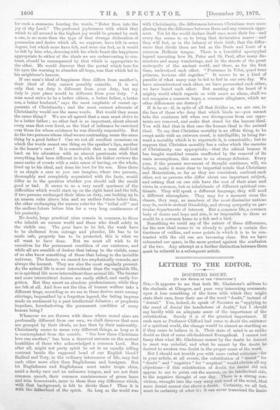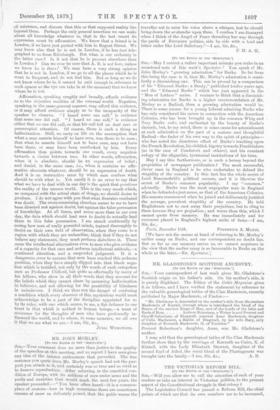LETTERS TO THE EDITOR.
DOUBTING DOUBT.
(To THE EDITOR OF THE .4 ISPEOTATOTI.1 SIlt,—It appears to me that both Mr. Gladstone's address to, the students at Glasgow, and your very interesting comments upon it lose something of the force with which they might state their case, from their use of the word " doubt," instead of " denial." You, indeed, do speak of Socratea as " applying to- the creed of denial the touchstone of doubt," but I should say hardly with an adequate sense of the importance of the substitution. Surely it is of the greatest importance. If such men as Professor Clifford had conic to doubt the existence• of a spiritual world, the change would be almost as startling as if they came to believe in it. Their state of mind is as unlike doubt as that of some old-fashioned Evangelical. I cannot but fancy that what Mr. Gladstone meant by the doubt he desired to meet was unbelief, and what he meant by the doubt he- desired to awaken was doubt in the proper sense of the word.
But I should not trouble you with mere verbal criticism— for in your article, at all events, the substitution of a denial " for " doubt " and " negative " for " sceptical " would obviate all my' objections—if this substitution of doubt for denial did not appear to me to point out the answer, on its intellectual side, to the negative thought of our day. There is a strong con-. viction, wrought into the very warp and woof of the mind, that mere denial cannot rise above a doubt. Certainty, we all feel, must be certainty of what is; it can never transcend the limits 'of existence, and discern that this or that supposed reality lies beyond them. Perhaps the only general assertion we can make about all knowledge whatever is, that in the last resort its expression must be affirmative. We know that a friend is in London, if we have just parted with him in Regent Street. We may know also that he is not in London, if he has just tele- graphed to us from Edinburgh. But what is our certainty in the latter case ? Is it not that he is present elsewhere than in London ? Can we ever be sure that A. B. is not here, unless we know he is there ? We may have a very strong opinion that he is not in London, if we go to all the places which he is wont to frequent, and do not find him. But so long as we do not know where he is, it cannot be said (except in reference to such spaces as the eye can take in at the moment) that we know where he is not.
Affirmation, speaking roughly and broadly, affords evidence as to the objective realities of the external world. Negation, speaking in the same general manner, may afford this evidence, or it may afford evidence simply as to the incapacity of the speaker to observe. " I heard some one call," is evidence that some one did call. " I heard no one call," is evidence either that no one did call, or that his call fell on deaf ears or preoccupied attention. Of course, there is such a thing as hallucination. Still, we carry on life on the assumption that what a man asserts himself to have seen, was there to be seen ; that what he asserts himself not to have seen, may not have been there, or may have been overlooked by him. Every affirmation thus points towards one result, every negation towards a choice between two. In other words, affirmation, when it is absolute, should be an expression of belief ; and denial, in the same case, i.e., when it contains no affir- mative elements whatever, should be an expression of doubt. And it is an instructive error by which men confuse what should be with what is. Yet surely it is an error to say that what we have to deal with in our day is the spirit that questions the reality of the unseen world. This is the very result which, as compared with the actual state of things, we should desire to .produce. I do not agree with you that what Socrates combated was doubt. The cross-examining elenchus seems to me to have been directed not against doubt, but against the false persuasion of knowledge. At all times, and never more than in our own day, the data which should lead men to doubt do actually lead them to this false persuasion. I am struck continually by seeing how men of really powerful minds, trained thoroughly to ,doubt on their own field of observation, when they come to a region with which they aro unfamiliar, think that if they do not believe any statement, they must perforce disbelieve it. These seem the intellectual alternatives even to men who give evidence of a capacity for that rare and arduous intellectual attitude,—a continued attention, and a suspended judgment. It is a dangerous error to assume that men have reached this arduous position, when they have simply slipped into that blank nega- tion which is testified, not only by the words of such outspoken men as Professor Clifford, but quite as effectually by many of his fellows, who show in all their words that they account for the beliefs which they cannot share by assuming hallucination in believers, and not allowing for the possibility of blindness in unbelievers. I think we thus run the danger of confusing a condition which every observer of this mysterious world must acknowledge to be a part of the discipline appointed for us by its ruler, with one which seems, to me, a flat defiance to our trust in that which is noblest in human beings,—a want of reverence for the thoughts of men who have profoundly in- fluenced the world, and to whom, in some measure, we all owe it that we are what we are.—I am, Sir, &c.,
JULIA WEDGWOOD.







































 Previous page
Previous page